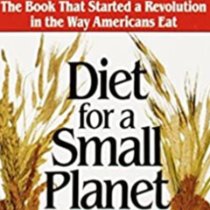
Ingredients:
1 C dry lentils
2 T olive oil
2 large onions, chopped
1 carrot, chopped
1/2 tsp dried thyme
1/2 tsp dried marjoram or oregano
3 C vegetable or chicken stock
Salt to taste
1/4 C chopped fresh parsley
1 can peeled tomatoes (about 1 pound)
1/4 C dry sherry or white wine
Grated swiss cheese for topping
Directions:
- Sort and wash lentils; set aside
- In a large pot, sauté the carrots and onions in the olive oil 3 – 5 minutes
- Add thyme and marjoram, and sauté for 1 min. more
- Add stock, parsley, salt, lentils and tomatoes; bring to a boil
- Turn heat down to low and simmer, covered, until lentils are tender (45 min)
- Add the sherry or wine, (if desired)
- Serve topped with grated Swiss cheese
Story:
“I have been making this recipe for over 25 years and still love it! Originally found in the book ‘Diet for a Small Planet.’ Going to make it this week! The original recipe says it's great accompanied by cornbread!” - Jean Feeney
Diet for a Small Planet first published in 1971 was a life-changing book for many of us in the 70’s and 80’s. It wasn’t an easy read as author Francis Moore Lappe outlined the huge cost of eating high on the food chain, especially animal proteins from factory farms. What stuck with me was that plant protein – legumes and whole grains – was not that hard to include in my pantry and weekly meals. My eating habits shifted, but I didn’t know what to do about bigger issues.
Over 50 years later, climate change and the growth of corporate farms and giant meat processing corporations make our choices important for our small, warming planet. With care as consumers and an openness to learn about food and farm policy, we can help be the conversion needed for Mother Earth and our human family.
Anyone want to start a book group? Here is my next read:
Let's Ask Marion: What You Need to Know about the Politics of Food, Nutrition and Health
by Marion Nestle in conversation with Kerri Trueman
In an easy Question and Response format, Nestle relies on her work as a nutrition scientist. She “encourages us to vote with our forks, but urges us also to vote with our votes to make it easier for everyone to make healthier dietary choices.” She educates us to ask questions and “engage in politics to advocate for food systems that make better food available and affordable to everyone, that adequately compensate everyone who works to produce, prepare, or serve food, and that deal with food in ways that conserve and sustain the environment.”
If you would like to be notified when we share new recipes, be sure to scroll to the bottom, provide your email address, check the box confirming you are not a robot, click on a few photos to prove it and click subscribe! You will then receive an email after each new post. Remember, we're always looking for new recipes, so keep sending them to ecopact@fspa.org!





Post a Comment